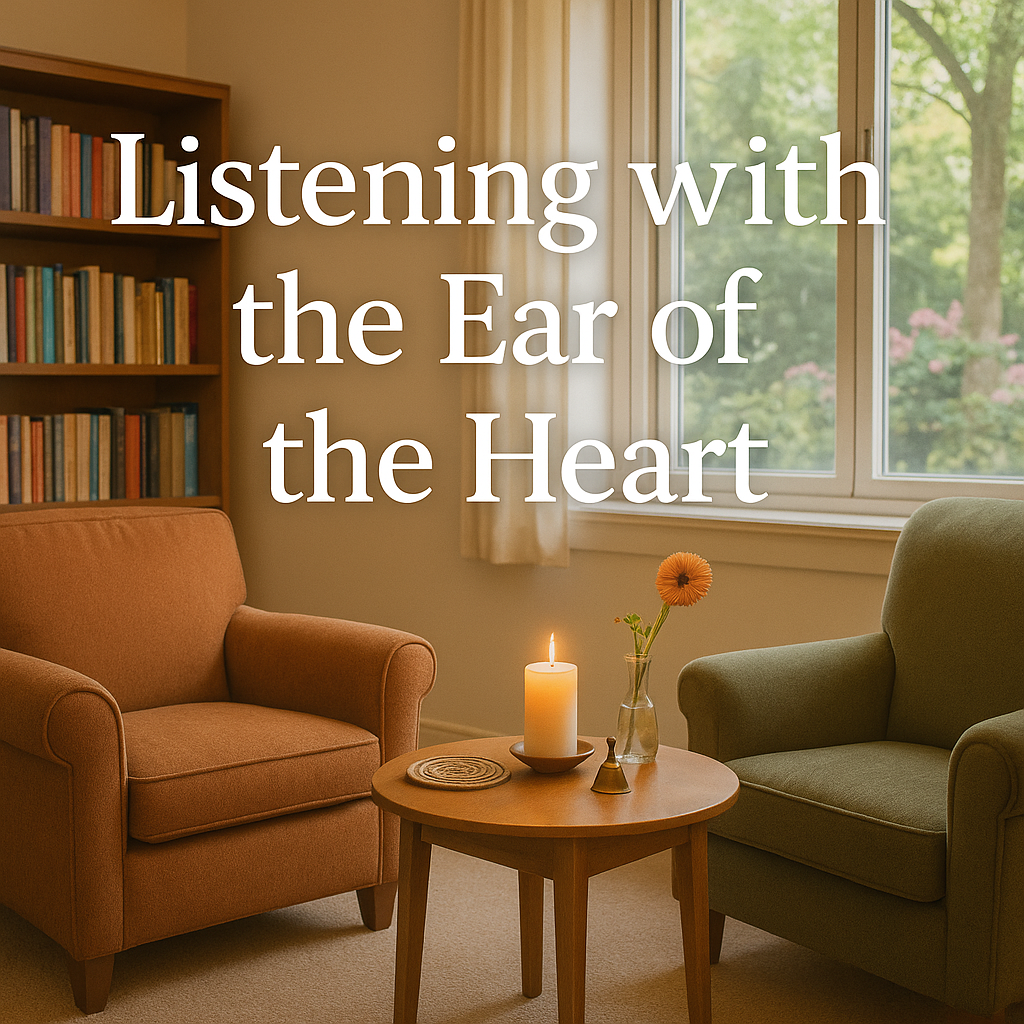Listening with the Ear of the Heart: A Simple Practice
At the heart of all the work I do, whether I’m sitting with someone in spiritual direction, supporting a family through the death of a beloved animal, guiding a student toward greater confidence in their English, or creating a wedding ceremony that captures the beauty of a couple’s unique journey, one practice remains constant:
Listening with the ear of the heart. 💗👂
✨ Where the Phrase Comes From
This phrase, drawn from the Rule of St. Benedict, invites us into a deeper kind of listening. When St. Benedict wrote, “Listen carefully, my child, with the ear of your heart,” he wasn’t just talking about paying attention, he was pointing to a practice of presence, humility, and love.
Listening in this way means setting aside our own agendas, quieting the inner chatter, and being fully available to another person; open not just to their words, but to their experience, emotions, and spirit.
✨ How Spiritual Direction Uses Heart-Centered Listening
Over the centuries, spiritual directors have adopted this Benedictine wisdom as a core part of our work. In spiritual direction, listening with the ear of the heart creates sacred space. It’s an intentional, contemplative way of being present with another without trying to fix, convert, or judge.
Instead, the listener becomes a mirror, reflecting back the sacred thread in someone’s story, noticing what shimmers, and gently walking alongside them as they seek clarity, healing, or deeper connection.
✨ A Bridge to Secular Practice: Unconditional Positive Regard
Even outside of religious or spiritual settings, this kind of deep listening resonates. In psychology, it aligns closely with unconditional positive regard, a term coined by Carl Rogers to describe fully accepting and valuing another person without judgment.
When we offer that kind of attention, we’re saying: You matter. Your truth belongs. I am with you.
✨ A Foundation for All My Work at Life and Death Services
For me, listening with the ear of the heart is the foundation of everything I do through Life and Death Services.
It allows me to meet each person exactly where they are, whether in grief, in joy, in uncertainty, or in transition.
It fosters trust.
It nurtures empathy.
And it supports the kind of active, attentive presence that’s often missing in our busy world.
💍 An Example: Crafting a Wedding Ceremony with Heart
One place this comes to life in a special way is in my officiant work. When I meet with a couple preparing to marry, I don’t just ask what readings they want or which vows they’ll choose.
I ask them to tell me their story:
How did you meet?
What surprised you about each other?
What have you already built together?
What are your hopes for the life ahead?
I listen, not just for facts, but for meaning, for connection, for the spirit beneath the words.
Then, when I create their ceremony, it’s not a generic script. It’s a blessing woven from their lived love story.
✨ What This Kind of Listening Offers
When we listen with the ear of the heart, we:
Honor the sacredness of each person’s experience
Encourage mutual respect and authenticity
Open the door to healing and transformation
Invite presence instead of performance
Strengthen our capacity for compassion, for others and ourselves
🕯️ A Final Thought
This is a simple practice, but not always an easy one. It asks us to:
Slow down
Be curious instead of certain
Let silence have its place
But when we do, we connect in deeper, truer ways.
Wherever you are on your journey—celebrating, grieving, learning, or simply trying to find your next step—I hope you’ll find in me someone who listens with the ear of the heart.
That’s the promise I bring to every client and every encounter. 🧡

